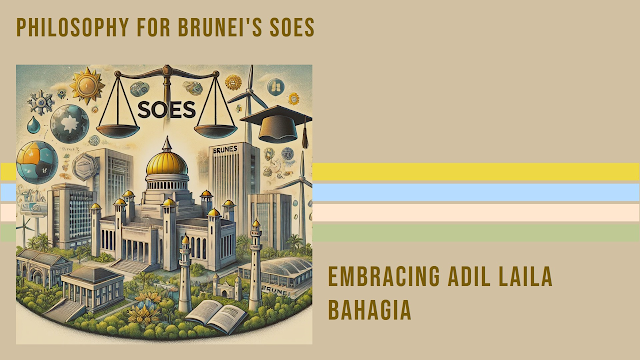"As 2024 fades into history, Brunei faces a pivotal moment: will the calls for reflection and renewal spark meaningful change, or will 2025 be another year of missed opportunities? With challenges like budget deficits, underemployment, and governance inefficiencies looming, the time for action has never been more urgent. The message is clear—will we rise to the occasion?"
BELAIT, 30TH DECEMBER 2024: As 2024 draws to a close, the mosques and suraus of Brunei resonate with a powerful message that touches the heart of every individual in the nation.
On 27 December 2024, Imams delivered the final Friday sermon of the year, urging the people to reflect on their actions, repent for their mistakes, and enter 2025 with renewed purpose and determination.
But are we truly listening, or have these calls for introspection and change become mere rituals?
Delivered on 25 Jamadilakhir 1446 in the Islamic calendar, the sermon served as a stark reminder that time waits for no one.
Imams called congregants to recognise the end of the year—whether they acknowledged it or not—and to observe this final Friday of 2024.
This was a moment to evaluate their deeds over the past year—both good and bad—and to plan for self-improvement.
Gratitude was expressed for the blessings of peace, harmony, and prosperity that Brunei experienced throughout the year, with prayers offered for these blessings to continue into 2025.
However, the lingering question remains: how many of us truly heed this call? How many are content with the status quo, allowing complacency and mediocrity to take hold?
A Sobering Call for Personal and Collective Reflection
The Imams emphasised the significance of reflection, urging congregants to evaluate their actions over the past year.
Worshippers were reminded to consider whether they had fulfilled their obligations to Allah, such as performing daily prayers, paying zakat, fasting, and avoiding prohibited actions like bribery and usury.
The sermon also encouraged individuals to take stock of their personal responsibilities, to improve upon their shortcomings, and to strive for higher standards where they had already excelled.
While the sermon focused on individual reflection, its themes resonate with the broader challenges facing Brunei as a nation.
The timeless wisdom of reflection, accountability, and renewal transcends personal lives and extends to the collective responsibilities of society.
As 2024 concludes, Brunei continues to grapple with significant challenges, including decades of budget deficits, persistent unemployment and underemployment, slow economic development, and difficulties in attracting sufficient Foreign Direct Investments (FDIs).
These issues are further exacerbated by governance inefficiencies, the emergence of "Little Napoleons"—mid-level bureaucrats who misuse their authority—and a pervasive mindset of short-termism that prioritises immediate fixes over sustainable solutions.
The sermon emphasises that true progress starts with self-awareness and a commitment to improvement, applicable to individuals, organisations, and the nation as a whole.
Bridging the Sermon’s Message to Collective Challenges: A Call for Action Across All Sectors
The well-being of Brunei relies on how effectively various sectors—State-Owned Enterprises (SOEs), government institutions, private businesses, corporations, and small and medium enterprises (SMEs)—align their actions with the nation’s aspirations of Adil Laila Bahagia, which means justice, happiness, and prosperity.
Just as individuals are encouraged to reflect on their responsibilities and shortcomings, these entities must assess their contributions to national progress and societal welfare.
The sermon’s call for reflection applies equally to these sectors. SOEs and government institutions must commit to transparency, innovation, and ethical governance to overcome stagnation.
Private businesses and corporations should implement sustainable practices and prioritise long-term investments that create meaningful opportunities for Bruneians.
Additionally, grassroots leadership, particularly among Ketua Kampongs and Penghulus, needs revitalisation to strengthen communities and foster trust between the people and the government.
Mental Health and Workplace Culture: A National Concern
The sermon’s emphasis on self-reflection also underscores the necessity of addressing mental health issues in Brunei.
Toxic workplace cultures, often characterised by narcissistic leadership and unhealthy power dynamics, have increased stress and anxiety for many individuals.
Although the Imams did not explicitly address this issue, their message of sincerity, humility, and the pursuit of improvement serves as a valuable reminder for organisations to prioritise mental well-being.
Mental health is a collective challenge, not merely an individual responsibility.
Organisations must foster supportive environments in which employees feel respected and valued, recognising that mental well-being is crucial to productivity and societal progress.
Addressing Economic and Societal Challenges
The sermon’s message of renewal is particularly relevant as Brunei advances toward Vision 2035.
The nation must shift from cautious spending to strategic investments in sectors such as renewable energy, education, tourism, and digital technology—areas that have the potential to diversify the economy and lessen reliance on oil and gas revenues.
To attract foreign direct investments (FDIs) and stimulate economic growth, Brunei must streamline bureaucratic processes, enhance competitiveness, and position itself as a stable and ethical investment destination.
Empowering SMEs and fostering partnerships with SOEs can lead to inclusive supply chains that support local industries and drive innovation.
Moving Forward: A National Call to Action
The final Friday sermon of 2024 serves not only as a spiritual exercise but also as a wake-up call for Brunei as a whole.
It encourages both individuals and institutions to reflect, renew, and take meaningful action.
The principles of accountability, sincerity, and a commitment to improvement must guide efforts at every level—from governance to businesses, from community leadership to individual households.
As 2025 approaches, Brunei faces a crucial choice: Will we heed the sermon’s call for introspection and renewal, or will we allow another year of potential to slip away?
Across all sectors—state-owned enterprises, government institutions, private businesses, small and medium-sized enterprises, and communities—there is a shared responsibility to address the challenges ahead.
By cultivating a culture of accountability, innovation, and collaboration, Brunei can realise its aspirations and achieve a future grounded in Adil Laila Bahagia.
The Imams have delivered their message. The question now is: will we listen? Or will 2025 be another year of missed opportunities and unfulfilled potential? Brunei, the choice is ours to make. (MHO/DEC?2024)


.jpeg)

